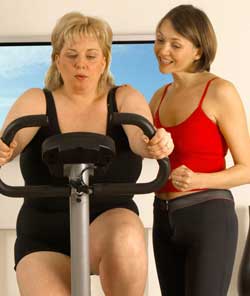
By KAREN ASP
Getting fitter and healthier might top your clients’ list of resolutions, but there’s no reason it shouldn’t top yours as well, especially when it comes to your personal training business. Of course, given today’s economic times, growing that business can be almost as challenging as losing weight. This is where ACE’s Lifestyle & Weight Management Coach (LWMC) certification comes into play. Whether you’ve been trying to reach a larger audience, better understand how to help overweight individuals achieve and maintain a healthy weight, or set yourself apart from other trainers, the LWMC just might be your ticket to success.
Since its debut in 1995, this certification has been known as the Lifestyle & Weight Management Consultant. This month, however, in an effort to clarify the role of this type of fitness professional, ACE relaunched the certification by renaming it the Lifestyle & Weight Management Coach.
“LWMCs have always coached people through weight-related and lifestyle changes,” says Todd Galati, M.A., director of the ACE Academy. “So the name change simply clarifies the scope of practice for fitness professionals, and for consumers it will explain more clearly what an LWMC can do for them.” (Note that if you already have the LWMC certification, you can switch your title from consultant to coach, and that’s the only change you’ll have to make.)
 Are you an ACE-certified Lifestyle & Weight Management Coach? Share your stories and experiences with helping clients achieve their weight-loss goals in the comments section below.
Are you an ACE-certified Lifestyle & Weight Management Coach? Share your stories and experiences with helping clients achieve their weight-loss goals in the comments section below.
The certification, which ACE Certified News featured in the February/March 2010 issue, focuses on exercise, nutrition and lifestyle change, all of which are designed to give you the knowledge and insight to help people with weight-related issues. “As personal trainers, we have all of these programs and tools to get people in better shape, but first, they have to want to make exercise a part of their lifestyle, which is where the LWMC becomes important,” Galati says. “With the LWMC, fitness professionals can teach people how to make lifestyle changes and then adhere to them, no matter how stressful or challenging life gets.”
Curious to learn how this certification might boost your business? To answer that question, we chatted with four ACE-certified pros to find out how the LWMC certification has benefited them.

Lisa Graham (LG) is an ACE-certified Lifestyle & Weight Management Coach, Personal Trainer and Advanced Health & Fitness Specialist who works at a health club in Lancaster, Pa. About 80 percent of her clients want to lose weight and have health-related issues due to their excess weight, including heart disease, high blood pressure and diabetes. Graham, who earned her LWMC certification five years ago, knows firsthand what it is like to battle weight, as she was once 60 pounds overweight.
 Mark Jackman, Ph.D., (MJ) specializes in weight-management and exercise programs for medical conditions and post-rehabilitation. He operates out of a 500-square-foot facility at his house in Durham, N.C., where clients have come to him for the past 14 years. He is an ACE-certified Advanced Health & Fitness Specialist, Personal Trainer and LWMC, which he earned in 1998. He is also a medical exercise specialist certified by the American Academy of Health, Fitness and Rehabilitation Professionals, and has served on ACE certification exam item-writing and role delineation committees, including the LWMC.
Mark Jackman, Ph.D., (MJ) specializes in weight-management and exercise programs for medical conditions and post-rehabilitation. He operates out of a 500-square-foot facility at his house in Durham, N.C., where clients have come to him for the past 14 years. He is an ACE-certified Advanced Health & Fitness Specialist, Personal Trainer and LWMC, which he earned in 1998. He is also a medical exercise specialist certified by the American Academy of Health, Fitness and Rehabilitation Professionals, and has served on ACE certification exam item-writing and role delineation committees, including the LWMC.

Robyn L. Kretschy (RK) is the founder of Healthy Results in Chicago, a company that focuses on fitness, nutrition and wellness services. Kretschy, an exercise physiologist whose clients are mainly interested in making lifestyle changes, became LWMC certified in 2006, adding it to her exercise science degree and other fitness-related certifications. Kretschy is also involved with ACE certification committees, and recently took part in a role delineation panel for the LWMC certification.

Bev Todd (BT) owns a personal training studio in Richmond, Va. Although she works with clients of all ages, Todd specializes in working with middle-aged adults. She earned her LWMC certification in 1999 and is also an ACE-certified Personal Trainer.
ACE: Why did you decide to pursue the LWMC certification?
Lisa Graham (LG): I became a personal trainer to help people lose weight. Once I had earned my personal training certification, I went after the LWMC so I could be even more effective in meeting this goal. The certification gave me all of the tools I needed to work with this population.
Bev Todd (BT): I thought it would be a great complement to my personal training certification and enhance my skills as a trainer. Any time you’re working one-on-one with a client, you get lots of questions about so many issues, including nutrition, and I wanted to be able to provide better answers for my clients.
Robyn L. Kretschy (RK): I could see that consumers were becoming not only unfit, but also unhealthy. And as fitness professionals, we needed to teach people not only how to exercise but also how to make behavior and lifestyle changes. The LWMC reflected that evolution, which is why it appealed to me.
Mark Jackman (MJ): I was interested in weight management because I could see that along with American waistlines, the market was growing. However, it was more than just earning potential. I had—and still have—a passion for helping people become healthier and avoid the healthcare delivery system, if possible. I knew weight management required not only exercise, but also the ability to work with psychosocial factors affecting clients, such as motivation and reasons for overeating. I already had the exercise part from being a personal trainer, I knew a lot about psychosocial factors having obtained a Ph.D. in social psychology, and I had a good idea about basic nutrition. What the LWMC certification did was provide an applied framework for putting all of that together to help clients. It helped me develop a comprehensive approach to helping people change behavior patterns that would lead to weight management.
ACE: How has being certified as an LWMC helped your business grow?
RK: Being an LWMC has helped me develop better relationships with current and future clients. I let them know that when they work with me, they’re not going to get a trainer who just counts sets and reps. I can offer them so much more than that. Plus, being an LWMC encourages collaboration with other health professionals. When I talk with physicians about collaborating with them on weight-management cases, I always point out my LWMC [certification], which assures them that I have special skills and knowledge to work with this population.

LG: Being an LWMC has allowed me to create a niche for myself, as I’m now known in my club as the trainer who specializes in weight loss, and clients come to me specifically for weight-loss issues. So I’ve attracted more clients who want to lose weight, and I’m not sure that would have happened without the LWMC certification. I’ve also run weight-loss programs at my club, and I work closely with the club’s dietitian to help individuals who are struggling with weight issues, and I doubt those things would have happened if I’d had only a personal training certification.
BT: This certification has helped set me apart from my competition. I think clients see that I’m a step above other personal trainers. It’s also helped me become a more well-rounded personal trainer.
MJ: The LWMC certification has allowed my business to grow because it helped me learn more about the essentials of weight management and how to apply them effectively while allowing for individual differences among clients. And when a prospective client or referring health professional interviews me, they can tell that I’m knowledgeable about weight management and behavior change.
ACE: Were you able to raise your rates after becoming LWMC certified?
RK: Yes, I waited until after I received the LWMC certification to raise my rates. I wrote my clients a letter to let them know that I had another certification and thus, more skills that would help them achieve their goals.
MJ: I also raised mine as well. When you can offer clients more services, you can charge more.
ACE: How has the LWMC certification enhanced your skills as a trainer?
RK: With the LWMC certification, I’ve become a better listener. It’s also taught me not to focus all of the time on exercise. Every now and then, I might have a session with a client that doesn’t include structured exercise. Instead, we might skip the treadmill and weights and walk outside and talk about what’s happening with that client. That’s what really sets trainers with the LWMC certification apart from other personal trainers—we know when to make that decision not to focus on exercise and instead, figure out what obstacles that individual is facing.
MJ: I can offer comprehensive, quality services tailored to individual clients. Because of that and the results I get, not only can I charge higher fees, I also command high client loyalty. The latter helps because I've found that lifestyle change requires time and persistent, dedicated effort within the context of a collaborative relationship with the client. It’s generally not a quick fix, and cookie-cutter approaches probably wouldn’t work in the long run with my clients.
LG: Everybody knows that if you want to lose weight, you have to exercise more and eat less. But because of this certification, I can help people work though their mental and emotional barriers to weight loss and help them unravel patterns that are holding them back. In all honestly, it helps me get inside a client’s head.
ACE: Can you offer examples of how you've been able to help an individual with your LWMC certification?
LG: I’ve been working with a woman who came to me when she was well over 200 pounds. During our first meeting, she told me she didn’t believe she could lose weight. She had tried every diet and every gimmick, and nothing had worked. So for the first six weeks, I simply worked to unravel her behaviors and figure out what was holding her back. It was more about restructuring her life and putting things in place that would help her succeed. At that point, something clicked in her mind, and as she began to follow the steps we worked on, the weight began coming off. In 12 weeks, she lost 38 pounds, and she’s been on fire every since then. She’s become a regular exerciser, and along with changing unhealthy habits, she also now believes in herself.

BT: I have a woman I’ve been working with for about seven months, and when we first started working together, she resisted everything. I was also working with her husband, and she signed up with me only because of him. As I talked with them about changing their behaviors, I could see she clearly wasn’t interested. So I started small and asked her to write down all of the foods she loved to eat. After she got over the fact that I wasn’t going to ask her to give up everything, she began to listen. I asked if she could give up one item—and one item only—for one week. She thought that would be easy, and as the week progressed, she had eliminated more items from the list, even replacing them with some ideas I had given her. She was also a big soda drinker, but asking her to give it up wasn’t an option. Instead, I asked her to add one bottle of water to her day. As she did, she realized that she had eliminated one soda, sometimes even two. Dinners were also a problem so we started simple. I asked her to plan ahead one meal a week and then have her kids help her plan one meal a week. Soon enough, they were planning their dinners for five days. Those little steps were the key to her success, as she’s now lost more than 30 pounds. She even rides her bike to our sessions together. Without the LWMC certification, I wouldn’t have been able to help turn her life around.
MJ: Because I’m able to offer comprehensive weight-loss, exercise and behavior-change services, I’ve been able to do things like reverse diabetes in clients, get them off blood pressure medications and the like. With me, clients have a one-stop solution that would have been otherwise fragmented in a medical center or other large setting.
ACE: How do you get the word out about your LWMC certification? For instance, do you promote it on marketing materials?
LG: I’ve included the LWMC certification in my bio in any materials that clients receive, but although they know I specialize in weight loss, I’m not sure clients are that aware of this certification in particular.
RK: I’m trying to get the word out about it more, but I do explain it to clients, especially when we first start talking about working together. I find that people like knowing I have it and usually ask more questions about it.
MJ: I list the credential on sales materials like my Web site, brochures and business cards. If I’m talking with a client or referring health professional, I'll discuss the credential when there’s time and if I think they’ll understand its value.
BT: It’s a little challenging because many people don’t understand what a LWMC is, but I am highlighting it on my Web site and all of the marketing materials for my business.
ACE: How do you think the LWMC certification will help you survive and thrive in this business?
LG: It’s obvious that weight issues in this country aren’t going to disappear overnight. But we can’t just tell people to diet and exercise. Instead, we have to help them restructure their lives and work around their obstacles or else people will keep failing, and with the LWMC, I can help clients be more successful. I’m actually not interested in working with people who are a size four who want to get skinnier; I care about the people who are overweight and are sick and depressed, and with the LWMC certification, I can address their issues better. This certification has also inspired me to pursue a degree in nutrition and dietetics and someday, I hope to work in a clinical weight-loss setting.
RK: There’s no doubt that having the LWMC certification will add to my longevity in this business. It speaks, after all, to the evolution of the industry. If we want to help people lose weight, we can’t just stick them on machines and expect them to sweat it off. We have to go beyond that.
ACE: What advice might you offer to other ACE-certified Fitness Professionals who are considering becoming certified as an LWMC, but haven’t quite made up their minds?
MJ: If your goal is to provide a well-rounded service, especially for weight-management and weight-loss clients, it is money and time well spent. The tangible benefit is that if you offer better services, you’ll have better clients and better income. But there’s also the intangible benefit of knowing that you’re doing the right thing in helping people succeed.
BT: You can’t ever go wrong with additional education, as you’ll always find something in the certification that will help you as a personal trainer.
LG: If you care about overweight and obese people, then you need to be equipped to help them succeed, and this is a great way to do it. The LWMC gives you credibility to work with this population and help them make lasting changes to improve their health and the quality of their lives.
RK: As fitness professionals, we’re in the people business, and this certification offers you a way to tune into people better and truly help them.
_____________________________________________________________________________
 Karen Asp, freelance journalist and ACE-certified Fitness Professional, is a contributing editor for Woman’s Day and the Fit Travel columnist for AOL. She also writes regularly for numerous other publications, including Self, Fitness, Women’s Health, Better Homes and Gardens, Real Simple, Prevention, Runner’s World, Redbook and Men’s Fitness.
Karen Asp, freelance journalist and ACE-certified Fitness Professional, is a contributing editor for Woman’s Day and the Fit Travel columnist for AOL. She also writes regularly for numerous other publications, including Self, Fitness, Women’s Health, Better Homes and Gardens, Real Simple, Prevention, Runner’s World, Redbook and Men’s Fitness.